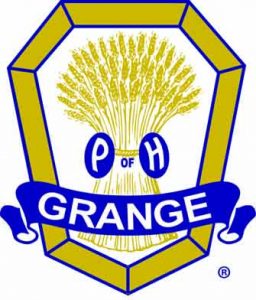
The National Grange of the Order of the Patrons of Husbandry was founded in 1867. Originally credited to Oliver Kelley and six men, Caroline Hall has since been credited as a founder. Grange#1 opened in 1868 in Fredonia, New York.
Oliver Kelley was commissioned by President Andrew Johnson to tour the southern states and collect data on farmers. Kelley overcame the distrust of Northerners by relying on his Masonic ties. As a consequence, original Grange rituals and rules were very similar to Masonic ones. Today Grange meetings are open and adherence to formal ritual ceremonies (opening of meetings and installation of officers) vary by Grange
In the late nineteenth century Grange membership approached one million members. But the decline of small farms and rural communities in the twentieth saw a decline in Grange membership, and many subordinate (local) Granges were abandoned.
The National Grange continues to work on behalf of agriculture, but it also promotes rural communities and promotes charitable activities.
From it’s earliest beginnings, the Grange has been non-partisan and inclusive of women. The importance of women is recognized by the fact that four Grange offices are only open to women only and there are no men only offices.
Grange Hierarchy
National Grange
State Grange
Pomona Grange
Local Grange
A local Grange is one like Marys River Grange#685, which is based on a community. A Pomona is an organization of local Granges within the state, often by county. The State oversees the assorted Pomona Granges in it’s jurisdiction, while the National Grange oversees the State Granges.
Grange Accomplishments
Some of the causes the Grange has worked for and helped implement.
- The Right of Women to Vote
- Full and Equal Participation of Women
- Establishment of U.S. Department of Agriculture
- Direct Election of Federal Senators
- Rural Electrification
- Free Rural Mail Delivery
- Rural Telephone Service
- Cooperatively Organized Activities (including Credit Unions, Farm Suppliers, Farm Credit Bureaus, Life and Health Insurance, Telephone, Grain Elevators, etc…)
- Agricultural Extension Service
- Quality and Equity in Rural School Systems
- Future Farmers of America
- 4-H Clubs
- Vocational Education in Public Schools
- Rural Medical Services & Rural Hospitals
- Preservation of Economic Viability of Small Family Farms
- Protection of Small Farms from Large Agri-Business
- Farm Friendly Credit and Banking Reforms
- Food and Medicine Purity and Labeling
- And many more rural issues.
